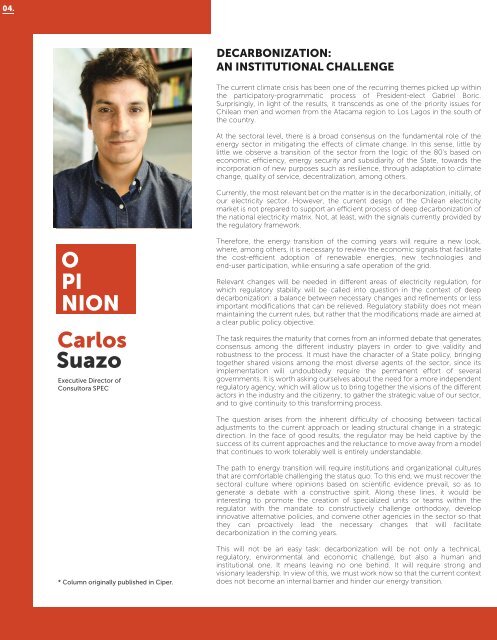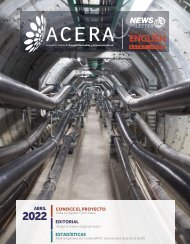Newsletter ACERA - Enero 2022
Create successful ePaper yourself
Turn your PDF publications into a flip-book with our unique Google optimized e-Paper software.
04.<br />
DECARBONIZATION:<br />
AN INSTITUTIONAL CHALLENGE<br />
The current climate crisis has been one of the recurring themes picked up within<br />
the participatory-programmatic process of President-elect Gabriel Boric.<br />
Surprisingly, in light of the results, it transcends as one of the priority issues for<br />
Chilean men and women from the Atacama region to Los Lagos in the south of<br />
the country.<br />
At the sectoral level, there is a broad consensus on the fundamental role of the<br />
energy sector in mitigating the effects of climate change. In this sense, little by<br />
little we observe a transition of the sector from the logic of the 80's based on<br />
economic efficiency, energy security and subsidiarity of the State, towards the<br />
incorporation of new purposes such as resilience, through adaptation to climate<br />
change, quality of service, decentralization, among others.<br />
Currently, the most relevant bet on the matter is in the decarbonization, initially, of<br />
our electricity sector. However, the current design of the Chilean electricity<br />
market is not prepared to support an efficient process of deep decarbonization of<br />
the national electricity matrix. Not, at least, with the signals currently provided by<br />
the regulatory framework.<br />
O<br />
PI<br />
NION<br />
Carlos<br />
Suazo<br />
Executive Director of<br />
Consultora SPEC<br />
Therefore, the energy transition of the coming years will require a new look,<br />
where, among others, it is necessary to review the economic signals that facilitate<br />
the cost-efficient adoption of renewable energies, new technologies and<br />
end-user participation, while ensuring a safe operation of the grid.<br />
Relevant changes will be needed in different areas of electricity regulation, for<br />
which regulatory stability will be called into question in the context of deep<br />
decarbonization: a balance between necessary changes and refinements or less<br />
important modifications that can be relieved. Regulatory stability does not mean<br />
maintaining the current rules, but rather that the modifications made are aimed at<br />
a clear public policy objective.<br />
The task requires the maturity that comes from an informed debate that generates<br />
consensus among the different industry players in order to give validity and<br />
robustness to the process. It must have the character of a State policy, bringing<br />
together shared visions among the most diverse agents of the sector, since its<br />
implementation will undoubtedly require the permanent effort of several<br />
governments. It is worth asking ourselves about the need for a more independent<br />
regulatory agency, which will allow us to bring together the visions of the different<br />
actors in the industry and the citizenry, to gather the strategic value of our sector,<br />
and to give continuity to this transforming process.<br />
The question arises from the inherent difficulty of choosing between tactical<br />
adjustments to the current approach or leading structural change in a strategic<br />
direction. In the face of good results, the regulator may be held captive by the<br />
success of its current approaches and the reluctance to move away from a model<br />
that continues to work tolerably well is entirely understandable.<br />
The path to energy transition will require institutions and organizational cultures<br />
that are comfortable challenging the status quo. To this end, we must recover the<br />
sectoral culture where opinions based on scientific evidence prevail, so as to<br />
generate a debate with a constructive spirit. Along these lines, it would be<br />
interesting to promote the creation of specialized units or teams within the<br />
regulator with the mandate to constructively challenge orthodoxy, develop<br />
innovative alternative policies, and convene other agencies in the sector so that<br />
they can proactively lead the necessary changes that will facilitate<br />
decarbonization in the coming years.<br />
* Column originally published in Ciper.<br />
This will not be an easy task: decarbonization will be not only a technical,<br />
regulatory, environmental and economic challenge, but also a human and<br />
institutional one. It means leaving no one behind. It will require strong and<br />
visionary leadership. In view of this, we must work now so that the current context<br />
does not become an internal barrier and hinder our energy transition.














